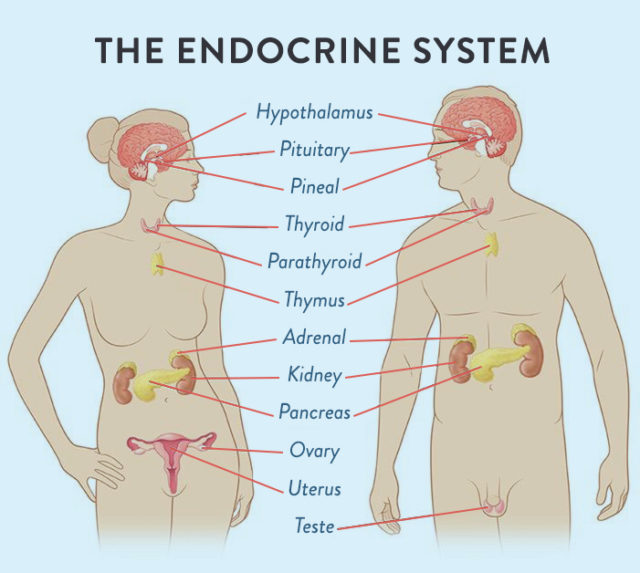Sixteen years ago, after having my third daughter, I was diagnosed with Hypothyroid Disease (an underactive thyroid – which I would later learn was Hashimoto’s – an autoimmune thyroid disease). That put me on a path to learn everything I could about the disease – both hypothyroid AND autoimmunity – and boy, is there a LOT to learn.
As I researched the thyroid gland and it’s physiology, I realized the connectedness the thyroid has to the adrenals, to stress and what’s known as the HPA Axis (Hypothalamic, Pituitary, Adrenal Axis). There are hormonal axes stemming from the brain that involve the thyroid, pancreas and ovaries (sex hormones) as well.

As much as science and medicine want to compartmentalize every organ and condition, know this:
It’s all connected – just like everything in the ‘body-mind’ – Ultimately, it comes down to how the mind communicates with our autonomic nervous system and how we perceive and respond to “stress” – or let’s just call it “life” (am I right?!)
So a few years ago as I continued to struggle with fatigue, brain fog and weight gain/weight loss resistance – which I attributed to the Hashimoto’s, I came across the Ketogenic diet. At the same time, I also started to hear more and more about Intermittent Fasting.
A few famous functional medicine doctors I highly respected had been teaching that Keto and fasting was not appropriate for thyroid disorders because it lowered thyroid hormone (T4>T3) conversion (T3 is the active thyroid hormone used by every cell in the body for metabolism). Basically, the thyroid gland produces mostly T4 hormone (~93%). The liver and gut convert most of the T4 to the active T3 in an enzymatic process that uses glucose. So the thinking was: KETO = LOW CARB (LOW GLUCOSE) = NOT GOOD FOR THYROID CONVERSION, but that belief is short sighted.
Zooming out a bit, the feedback loops between the adrenals, gut, liver and pancreas need to be considered. When it comes to low thyroid function, know that the thyroid is responsible for glucose metabolism. It is THE MASTER GLAND for metabolism – including carbohydrate breakdown and utilization.
So when we’re HYPO (under-active thyroid), we naturally become less efficient at metabolizing carbs which increases our insulin resistance because the glucose (carbs) we eat has a hard time entering the cells. The pancreas then pumps out more insulin because there’s more glucose in circulation. It’s looking for a place to go, but the cells aren’t letting it in. As I’ve explained before, insulin is a GROWTH HORMONE – it grows muscle and fat cells. Those who struggle with weight, usually experience the latter and have insulin resistance.
When we take in more glucose (carbs), the thyroid increases circulating T3 as well. So there’s an inverse relationship:
(^ Glucose = ^ T3 / v Glucose = v T3)
…so don’t panic if your T3 goes down on a low carb or Keto Diet. Lab values and even functional lab ranges are NOT based on the ketogenic/fasting diet population – they’re based on the average population (which is usually unhealthyl and carb-based – especially here in the US and in most modern cultures),
The body makes its own glucose – it can convert protein and even fat to glucose, but if you’re eating a real food KETO diet with a good amount of non-starchy vegetables, you’re probably getting plenty of glucose substrate to fuel the T4>T3 conversion. In terms of priority, as a hypothyroid individual (which I am), I’d definitely put my focus more on the implications of insulin resistance by eating too many carbs and not worry about getting enough dietary carbs “just in case” for thyroid conversion. – especially if I feel so good!
On the topic of Hashimoto’s with Keto and Intermittent Fasting, again, we have a good case for both:
- Keto is anti-inflammatory. We know that autoimmunity is rooted in inflammation.
- Keto and IF are gut friendly which is the cornerstone of supporting the immune system. Because carbs are reduced significantly and we tend to eat less often, the gut gets a nice break from using all it’s energy to break down and digest foods when we eat and graze all day long (as sugar burners). This allows for more repair and less assault from more inflammatory foods.
- The microbiome (gut flora) is also more supported with less of a load from sugars and starches which tend to be a primary cause of dysbiosis (bloating, etc..) and leaky gut. A balanced microbiome and an ‘in-tact intestinal lining’ are critical for immune regulation.
Here’s what to look out for if you’re thinking of going Keto or fasting and you have or suspect thyroid issues:
- Make sure you’re eating enough (and not too much if you’re trying to lose fat). Caloric restriction down-regulates thyroid function. Keto reduces appetite because fat is so satiating. Also, being Ketogenic balances blood sugar so cravings and hunger hormones come into balance. And although we want to encourage the body to use it’s stored energy (body fat); in the beginning, most people do better if they become fully fat adapted before they start cutting fat calories. Keep the total carbs under 30 grams (from only non-starchy veggies – some do best with 20 grams, some can go higher), get about 100-ish grams of protein (give or take) and get the rest from fat until satisfied. After a month or so when you’re feeling really good, you can start to gradually cut fat intake if you’re not losing inches.
- Go Slow. Drastically cutting carbs and restricting your eating window is likely going to be perceived as a stressor to your body. You need to take it slow because that stress will impact your adrenals – which is like eating donuts – I’ll get into all that in Part 2.
- Ensure you’re getting all the thyroid co-factors to support thyroid function: Iodine, Selenium, Vitamin D w/ K, Magnesium, Tyrosine, Zinc and B vitamins. Also Fish Oil and Black Cumin Seed have been shown to improve thyroid function and weight loss in people with thyroid issues. You can supplement, but also be sure to eat nutrient dense foods like wild fish, shell fish, sea vegetables/seaweed, pastured eggs and meats, Brazil nuts, spices and herbs, greens/cooked goitrogens like kale and broccoli (goitrogens inhibit thyroid function – but not if they’re cooked).
- Most importantly! Honestly Check In with how you feel on Keto and/or with fasting. If you don’t see improvement and especially if you feel worse – you may need to make adjustments or this just may not be for you (feel free to connect with me if you’re not sure).
Questions? Do you have experience with Keto and Fasting with thyroid dysfunction or hormonal imbalances? Share below or with me directly. Stay tuned for Part 2 – all about the adrenals and stress.





5 thoughts on “PART 1: THYROID – Keto & Fasting ‘BAD’ for Hormonal Imbalance?”
I have Hashimoto’s and find fasting to be very difficult. After fasting, it tskes me a couple of days to feel normal again. I do not drink coffee or tea and so I have no fat fueled drinks. Do you have any suggestions on how to fast and not crash? I have been doing Keto since October, but we put our house on the market and sold it and moved in June and my keto diet is less than what it should be and I am trying to get back on track.
Your article is exactly what I needed to read to remember why I am on this journey.
Thanks fot sharing it. 😊
Thank, Shannon! Ok there are a few ways to go about this:
1. Since you have had more than usual stress lately, just focus on going back to keto and feeling really good before tackling any intermittent fasting.
2. Go slower with the fasting – gradually push back your eating window – say breakfast by 30 minutes. So let’s say you normally have breakfast at 7am. Start moving it to 7:30 for a week. If that feels ok, then try to stretch it to 8 for a week, etc…Also be sure you’re eating enough, drinking water with sea salt and/or electrolytes.
3. I do better with clean fasting – just water, tea or coffee – unsweetened, no milk or fats – until my eating window is open. Then I may make a latte or Bulletproof coffee or tea if I feel like it. These are not essential at all, so don’t worry that you’re missing out by not having coffee or tea.
4. Skip the intermittent fasting – if you’re crashing – even when you’re fat adapted, that’s you’re body telling you something – it’s stressed – so just eat, but make it keto (if it feels good). I will say that appetite hormones do adapt after a few days, but don’t push it beyond that. You can still get so many blood sugar and digestive benefits by eating keto to satiety and skipping snacks – all of which will help your Hashi’s.
I hope this helps! Keep me posted!
xo,
Ev
I have been on Keto since Sept of 2017, my goal was to lose 30 lbs. I have not lost any weight as a matter of fact I have gain about 5 lbs. I am 58, menaposal and take Armour for Thyroid. I work out with a trainer and also walk daily. My ketones are .5 up to 1 never have been higher since I started testing. Fasting glucose is 80 to 100. Not sure why I am at a stand still with this weight. I average around 1300 cal. a day, I track my macros sometime but not always. I don’t fast because it make me feel to hungry than I will over eat. I have never got to that point where you say your not hungry on keto.
Hi Roxanne – Sounds like you’re not fat adapting and that’s frustrating – and simple to fix once you figure out why. A few things to look at:
1. Are you eating too much dairy and nuts? Or could there be another food sensitivity lurking that is causing stress in the body? Either will hinder progress.
2. Are your total carbs under 20 grams per day? I made this flub in my keto journey. I was more like 50 NET carbs and stuck – it was OK for maintaining but not for losing. Basically minimize or cut out the nuts and don’t overdo the higher carb veggies and keto treats and see what happens.
3. Sleep – are you getting 8 solid hours of sleep most nights? Poor sleep = no fat loss.
4. Stress – similar as above and I’ll deep dive into why and how this completely negates fat loss in the next post. This can be from overexercising, something going on in the body, mental/emotional stress, poor sleep – or just always being “on” – not getting into parasympathetic (relaxation state) < this is my challenge. Adrenal support might help but ultimately I had to slow down and teach myself to let things go and relax. 5. Alcohol - it can block progress. I cut back and switched my wine to Dry Farms and things got much better. You've spent a long time spinning your wheels and that's not what Keto is about. It's also not about forcing the body - especially the menopausal woman. Check out my packages: https://evelynd.com/workwithme/ to get 1:1 support or you can also join my free Facebook group and I can chime in more there. There’s also a meal plan posted there that you can follow. https://www.facebook.com/groups/2065884600399584/
Don’t give up! You just need to tweak and find the right Keto for you <3
xo,
Ev
Thanks Evelyn, your response made me realize a few things.
1) I thought the same thing about Dairy and nuts, so I did cut them out awhile ago. Still use a little dairy in my coffee
2) My net carbs were 20 or under. Did not track total
3) My sleep has suffered for sure with menapose
4) I think my stress level is low, however not getting enough sleep has me stressed ( I have started meditation) I have gone back on hormone replacement therapy because of this sleep issue it was making me crazy.
5) I do not drink much Alcohol (maybe I should LOL!)
I do follow you on your facebook page, I am still doing keto not giving up. I need to change a few things.
Thanks so much
Roxanne